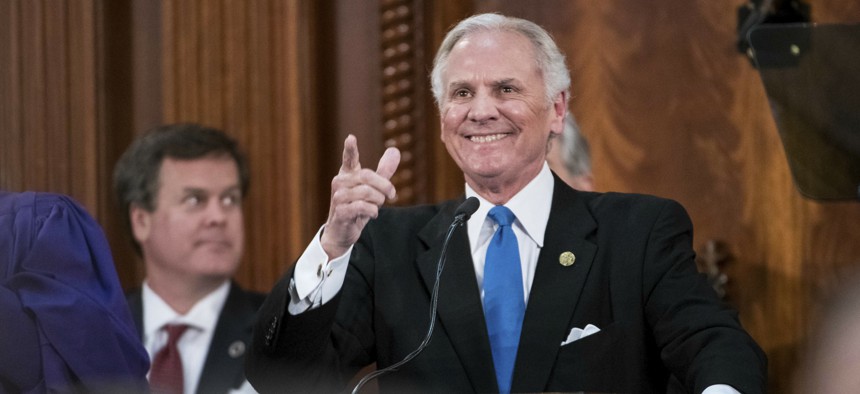South Carolina Becomes First Non-Medicaid Expansion State to Enact Work Requirements

South Carolina Gov. Henry McMaster has made Medicaid work requirements a priority for his administration. AP Photo/Sean Rayford
The state says it will boost people out of poverty. Critics say thousands will lose coverage.
Some adults covered by Medicaid in South Carolina will need to show they are working to continue receiving coverage, South Carolina Gov. Henry McMaster announced Thursday.
With the approval from the federal Center for Medicare and Medicaid Services, South Carolina becomes the first state that did not expand Medicaid coverage under the Affordable Care Act to implement work requirements.
The new requirements mean that any “able-bodied” Medicaid recipients will need to complete 80 hours of “community engagement” per month, meaning full-time or part-time employment, volunteer work, school, or job training.
"There is no reason for anyone who can work not to be working, especially if that person is able-bodied and is receiving public assistance," McMaster said at a news conference on Thursday. “Without meaningful work, life loses its joy and meaning."
Eighteen states have either implemented or sought waivers that would allow them to enact work requirements for certain Medicaid recipients. But federal court challenges have halted the requirements in New Hampshire, Kentucky and Arkansas, states that had previously received permission to implement the policy.
In South Carolina, Medicaid covers about one in five residents and more than 80% of recipients are children, senior citizens or disabled. Under the plan approved by CMS, the state is expanding coverage to parents to now include those who make 100% of the federal poverty level, up from the previous cutoff of 62%. The state also plans to offer Medicaid for one year to people who are chronically homeless, justice involved, or those needing substance use disorder treatment, according to the waiver approved by CMS. All are still subject to the work requirements unless they qualify and apply for an exemption.
The Affordable Care Act allows states to provide Medicaid coverage to families or adults without children with incomes up to 138% of the poverty level.
Exemptions to the new work requirement rule include pregnant women and parents who are the primary caregiver of a child or a disabled adult. But Joan Alker, executive director of Georgetown University’s Center for Children and Families, a critic of work requirements, pointed out that these groups will not be automatically exempted, as they were when the mandates took effect in Arkansas. Instead, recipients will have to apply for an exemption. For people who needed to apply for exemptions in Arkansas, the coverage loss rate was greater than 75%.
Seema Verma, the administrator for the Centers for Medicare & Medicaid Services said in a statement that the Trump administration is excited to grant states more flexibility. “South Carolina’s requirements—complete with appropriate protections—will lift South Carolinians out of poverty by encouraging as many as possible to participate in the booming Trump economy,” she said.
The South Carolina Appleseed Legal Justice Center, which advocates for low-income residents in the state, issued a statement criticizing the policy change. “The governor justifies these requirements based on the false belief that work causes people to be healthy, so people should lose their health insurance unless they are employed,” the statement reads. “Until we abandon efforts to criminalize, pester and punish the less fortunate, we will not solve South Carolina’s biggest problems.”
Two states, Indiana and New Hampshire, have postponed the implementation of their waivers while the legal challenges to work requirements play out. The Appleseed Center’s legal team believes that South Carolina will face similar challenges. “South Carolina will march on with these requirements, even when they will almost certainly fail in court, wasting countless taxpayer dollars and risking thousands of peoples’ coverages,” the statement reads.
Since South Carolina is the first state that didn’t expand Medicaid to receive permission to try work requirements, the impact isn’t entirely known. An analysis from Georgetown University’s health center estimated that as many as 14,000 South Carolina parents would lose their coverage within a year of work requirement implementation, either because they are unable to work or because they are unaware of the new rules or don’t know how to apply for an exemption.
According to the analysis, the work requirements would disproportionately cancel the healthcare coverage of African American mothers and those in rural areas where jobs are harder to come by, Georgetown researchers said.
The group based much of their analysis off of what happened in Arkansas, when 18,000 people lost Medicaid coverage after work requirements were put in place, and in New Hampshire, where 17,000 people lost coverage, before the policy was put on hold. A study of the Arkansas work requirements found that they did not increase employment.
Work requirements have been opposed by over fifty medical and legal organizations, including the American College of Physicians and the National Association of Community Health Centers. In March, the groups wrote to Alex Azar, the secretary of the Department of Health and Human Services, asking him to not grant states the waivers. “While our organizations believe helping connect people to work is a worthwhile goal,” the group wrote, “these waivers do not address the real barriers to employment faced by poor families, such as a lack of access to childcare, job training and transportation.”
Emma Coleman is the assistant editor for Route Fifty.
NEXT STORY: Someone Is Gluing Tiny Cowboy Hats On Pigeons in Las Vegas






